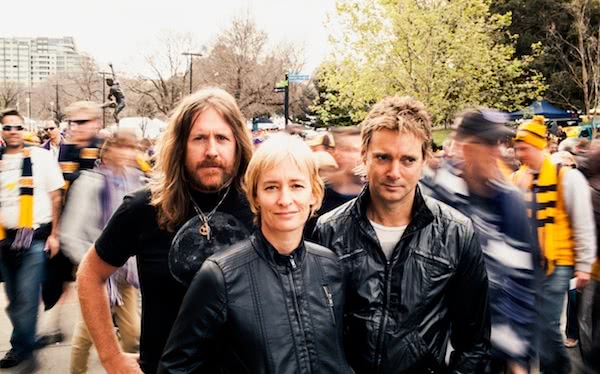Spiderbait’s reworking of the ‘Lead Belly’ Ledbetter classic ‘Black Betty’ may have catapulted the DIY trio into the Oz rock stratosphere in 2004, but they had long been superstars of the sweaty indie underground.
Sure, the ’00s saw their music smash through in US television and film as well as the odd EA computer game, but the aftershocks of their seminal 1997 album, Ivy And The Big Apples, are what resound even today. They’ve managed to transcend genre and generations – recently supporting Pink on her final Brisbane show – and have consistently and cleverly packaged Kram’s guttural rock jabs neatly in between Janet English’s saccharine and schizophrenic pop gems in a way that has left rock dogs and pop teens unwittingly sharing a common bond: their love for Spiderbait.
Spiderbait have never really gone away, so referring to their upcoming self-titled release as a ‘comeback album’ is unfair – but it has been almost ten years since they’ve brought out a new studio record. Spruiking LP number seven, Kram has just got off the phone with an interviewer who has left him aghast with a particular line of questioning, and we begin with a debrief. “[In] years gone by, I would’ve said, ‘Dude, you’re a dickhead, fuck off,’ but he was an OK guy. I can segue pretty easily out of a bad question.”
After a nine-year gap since Tonight Alright, do these moments serve a reminder that releasing an album isn’t all fun and games? “Nah,” says Kram. “It’s not really that bad. The reason we’re doing [another album] is just simply that we wanted to. Our label was really keen – we’ve been with Universal for over 20 years now and our manager and all these people seemed happy. We started to write the album over two years ago but when Franc [Tetaz, producer] came on board, I think that was the clincher. I think the fact that Franc wanted to do it and was so enthusiastic – he’d just worked with Gotye – having that outside excitement helped us get our shit together and get organised.
“We got to know Franc through Bertie Blackman, who I met through the Nick Cave Straight To You tour – I got to know a heap of guys through that. Bert was making her album with Franc at the time … it turned out we already knew him from way back in the day. He’s an old-school Melbourne cat, and [Bert] said that she was really sad at the end when the recording was over and to everyone else it [was] just beginning. I don’t usually feel like that with a record, but I do with this one; there’s an element of sadness to know we’ve stopped recording because it was such a pleasurable experience.”
For a while before entering the studio, Kram had already been smashing out some demos in his own little piece of paradise in northern NSW. Although he talks about home with absolute fondness, the man who has travelled the world with his music and tangled with the rock’n’roll lifestyle approaches his surroundings with a healthy scepticism. He’s been fronting (and backing) this band from almost 25 years, and he seems to look at the industry through the same lens that inspired ‘Buy Me A Pony’ – the one that says there’s good and bad in everything.
“I live really close to the beach and it’s a magical place. On the one hand it’s really lo-fi, you can ride your bike everywhere – there is a lot of music around here, I know Xavier Rudd lives a little way down the track from me – but yet if there was a tsunami, I was saying this to a friend the other day, none of us would survive. No matter where you are, there’s always some impending doom, in a way. I guess what I’m trying to say is, no matter what positive you find in a place there is always a negative to balance it out.”
The metaphor extends to Spiderbait’s yearly routine: experience allows them to bust out shows with the best of them, but the hard part is writing new material. “We play two or three shows a year and then we’ll do a festival like Splendour that’s pretty big, and people go, ‘Wow, why are you doing this, why haven’t you made a record?’ That’s the easy part for us. It’s easy for us to turn up, and we know enough and have played enough to be able to kick arse onstage and have a great time.
“Creating an album is a different story. You have to be able to connect on a different level; you have to be able to connect in that creative space and that takes some time, even though we’re best friends. We’d all gone off and done a lot of things in our own lives – Janet’s got one kid, I’ve got two and Damien [Whitty]’s been doing his own thing. It’s easy to separate. [Playing] gigs kinda kept us together in a way, even though we were doing really well in publishing and have been fortunate with that. Gigging has always been a great social event for us, and it rekindles our belief in each other and the audience – our belief that people want to see us play.”
Spiderbait marks another significant chapter in the band’s ever-growing timeline, says Kram. “We were originally going to try and do this as a 21st birthday celebration for the band, but it’s taken a while to get together and by the time the album comes out properly we would have been together for almost 25 years. We’re pretty proud of that; we think that’s kinda awesome because nobody really survives in this business for very long. If we were just playing in Shitsville and hadn’t had a hit for 20 years than it would all be a bit crap, but that’s not the story. We feel our most recent release was a huge hit, even though that’s getting on a few years now, but we still feel relevant. We still get played on triple j, we still get played on Triple M, and we kinda feel like we’re still doing OK. But at the core of everything is that we make music together – and that’s the one thing that we hadn’t done for a while – so we knew that was the thing we wanted to do together again.”
In true Spiderbait style, it’s turned out well. The band’s attitude to work is probably their greatest attribute; they’ve never been consumed by their success, and as a result continue to deliver. The sound they were looking for on this album came out of that state of mind. “Because I’d done solo [work] since our last record, I had a big focus on how we would put it all down,” Kram says. “In this group there are three individuals, three duos and one trio, and that was what we wanted represented. This album is the story of our whole band.”
BY KRISSI WEISS
Spiderbaitout now through Universal Music Australia.


































